A multi-award winning college on the remote border with Wales has flung its doors open to the public in every possible way. Jess Staufenberg explores the grounds
It would be easy to see Derwen College as a hidden-away, far-flung provider which even its own locals might forget was there.
First off, it’s by far the most remote FE provider I’ve ever visited. I actually have to travel through another country – Wales – on the train, before crossing back into England and finally reaching my destination village, the amazingly named Gobowen. I’m disoriented enough to wonder vaguely why the train conductor keeps translating everything into a mystery language, before realising how far west I’ve come and that it is, of course, Welsh.
In fact the journey is so long (and the wifi so unenthusiastic) that my languages app has me practically fluent by the time I arrive (“rwy’n ar goll”, should you ever need it, means “I am lost”).
Then the route to the college itself is a good 20-minute walk along a stretch of road to reach a modest gate announcing ‘Derwen College’. Residential housing has ended, and only the occasional car shoots past.
But the special educational needs provider benefits hugely from its remote location. Step through the gates, and it becomes clear the college has vast amounts of space: 52 acres in total.
On a tour I go past orchards, a walled garden, commercial greenhouses, a garden centre, a period drama-esque building plus restaurant, a “nurture centre” for learners with profound and multiple learning difficulties, huge games pitches and a fully functioning hotel. Yes, a hotel. Oh, and a vintage shop.
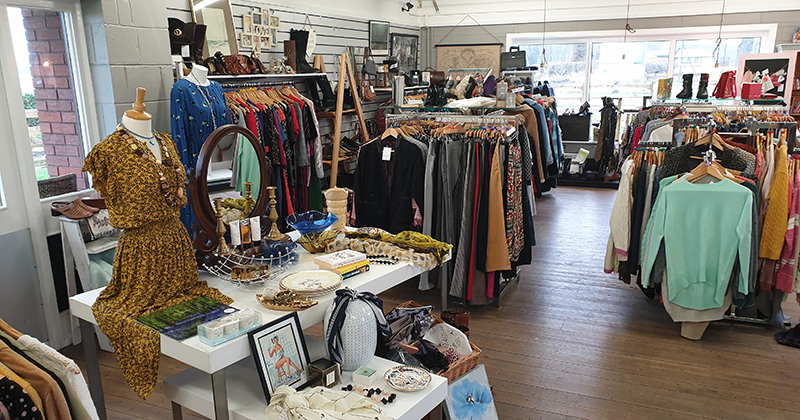
It’s more like arriving at a self-sufficient village than a college. Of the 150 students, 75 are residential, arriving from all over the country (and 22 learners are from Wales, according to Ofsted inspectors in 2021).
Learners achieve well, with a 100 per cent pass rate on average for those on accredited courses, according to the college data team.
Currently 83 per cent of learners are doing an accredited award in one of the college’s four specialisms: horticulture, hospitality and food, retail, and performing arts.
Other learners are on study programmes to develop independence. Three learners with the highest needs attend the specially equipped nurture centre, which opened in September.
The institution itself was founded 95 years ago by Agnes Hunt, later to become a dame for setting up the college and a nearby hospital. Back then, using the language of the day, it was called ‘Derwen Cripples’ Training College’.
Offensive terminology aside, Hunt was determined that disability should be no barrier to opportunity: she herself had brutal personal experience of it, living in terrible pain from a condition called osteomyelitis (inflammation of the bones).
But that history is hidden away on the college website, just as the college is hidden away geographically; and the provider could have chosen to remain closed in on itself, self-sufficient and self-contained.
Yet the staff team, led by principal Meryl Green, has been seriously putting Derwen on the map. Last year it won ‘specialist provider of the year’, it’s currently shortlisted in the Association of Colleges’ Beacon Awards for 2021/22, and its sports and leisure coordinator, Steve Evans, recently won Pearson’s ‘excellence in special needs education’ award.
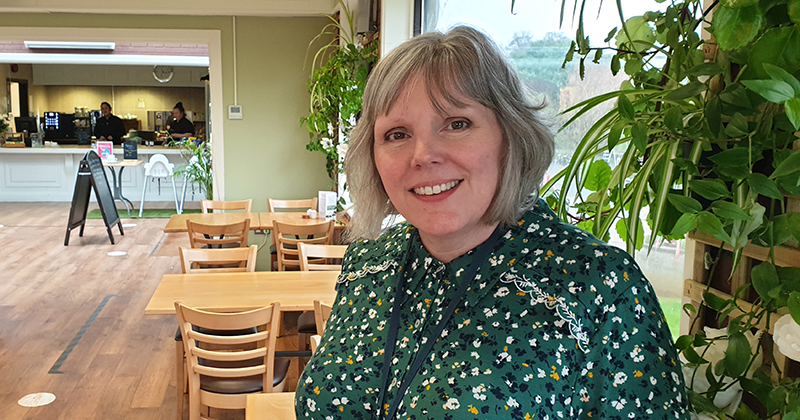
I sit down to lunch opposite Green, who exudes a powerful and reassuring college matriarch vibe. Just as in the garden centre, it is students who are serving us in the Walled Garden café, overseen by catering staff.
It’s at this point I realise what’s been unusual so far: I’ve yet to see anyone sat behind a desk (bar the receptionist).
“The way we deliver, we have very few classrooms. You’re sitting in one,” nods Green, gesturing around us. “Our classrooms are our vocational areas. It has evolved like this over time.”
During lockdowns, when many organisations were just trying to keep afloat, Derwen College managed to open two more of its “classrooms” – The Vintage Advantage Charity Shop and a food takeaway service.
“Lots of our external work experience placements had to close, and we had to close the Orangery too,” continues Green, referring to the college’s restaurant which, like the café, shop, hotel and garden centre, are all open to the public.
“So we set up an on-site takeaway!” Students designed the menu, emailed it out to staff, staff said what they wanted, and students prepared the food. “It was a very neat way of still giving them those skills development opportunities.”
The same issue was facing the college’s retail students, and so the vintage shop was launched. Reader, I can only say that if it was in north London, it would be gutted in a single day.
Two more warehouses on site are filled with donations, a staff member tells me. FE Week can confirm the quality was so good, it bought itself a dress.
“Everyone at home during lockdown was having a sort out, so it was the right timing, too,” smiles Green. The college plans to open another vintage shop if possible, with all proceeds going to teaching and learning.
It even turns out that the café in the waiting room at Gobowen train station, where I arrived earlier, is run by Derwen College students.
“It’s very good training for students – it’s all rush, and then it’s all quiet,” explains Green. “We will always look for a creative solution to a problem if we can, and see everything as an opportunity.”
The public-facing approach is perhaps most impressively demonstrated by Hotel 751, which has three bedrooms and was set up in partnership with Premier Inn about seven years ago (it takes its name from being the 751st in the chain).
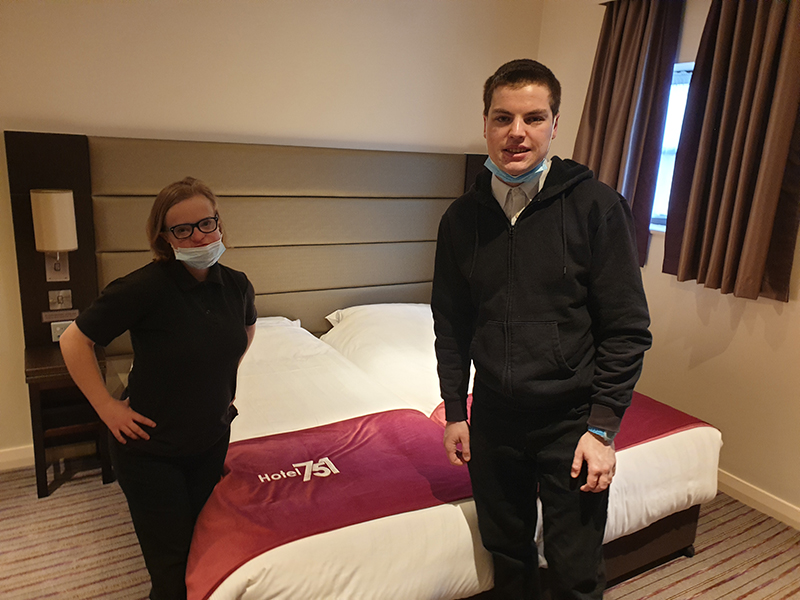
Even more ingeniously, the college has co-developed a video app that can take students through every step of their jobs.
This enables them to gain independence while training, rather than losing confidence and having to continually ask for help, explains teacher Katie Roberts.
One video, for instance, shows somebody knocking on a bedroom door and saying “housekeeping”, before going through the next steps, with verbal instructions overlaid. It’s a simple, brilliant idea.
Building self-esteem is central to Steve Evans’s work as sports and leisure coordinator at the college, who now oversees about 20 sports and activities at the provider. Back in 2014 he piloted the Duke of Edinburgh scheme with 11 students.
“We’d never done anything like that before. They’d never been away from college overnight, and I guess because of additional needs and medical conditions, it could have been a daunting prospect,” he tells me.
Some parents challenged him on whether he should be “taking my child canoeing down the River Severn,” he says. He gradually won them over, and today 60 students are doing the DofE award.
A more recent innovation has been to offer students a variety of activities to start their day at 9am, he continues. These range from high-intensity training to more gentle swimming, depending on whether they would benefit from “becoming more energised or feeling calmer” ahead of study.
It’s a hackneyed phrase, but for Evans there’s evidently no limit on what’s possible. The activities he hopes students can try are often out of the comfort zone of most able-bodied, neurotypical people, for instance.
“We’re looking at a climbing wall, and I’m looking at open water swimming, too. I like breaking down barriers. It is incredibly inspiring seeing what they can achieve.”
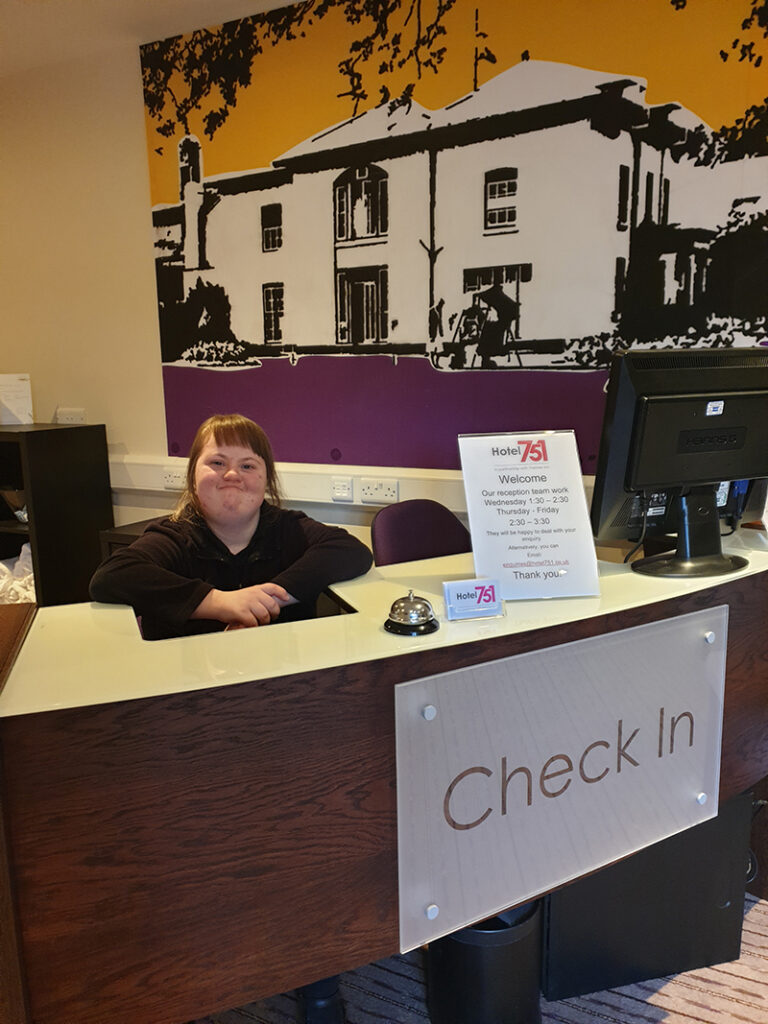
This message is led on by the students themselves. I’m back in reception, and Amy, a performing arts student, dances through the double doors (she most recently played the lead role of Belle in Derwen College’s production of Beauty and the Beast.
By the way, the college also has a signed dance group, and a ‘DC Narrators’ group – students who deliver storytelling in schools).
Amy, who is partially sighted, is clearly pleased at having got her DofE gold award, and brilliantly blunt about the bits she’d have happily skipped: “I came home smelling like the woods,” she grins. “But I’m happy, because now all my relatives are fighting to take me to Buckingham Palace.”
What does she think of Derwen College?
“My primary school was horrible. In high school I never really developed my confidence, and my other two colleges ̶ they were good but there wasn’t enough drama.
Here, there’s lots of drama, and I really like being residential.” Her next project at college is a play dealing with ‘acceptance’. “Just because we’re different, it doesn’t define us.”
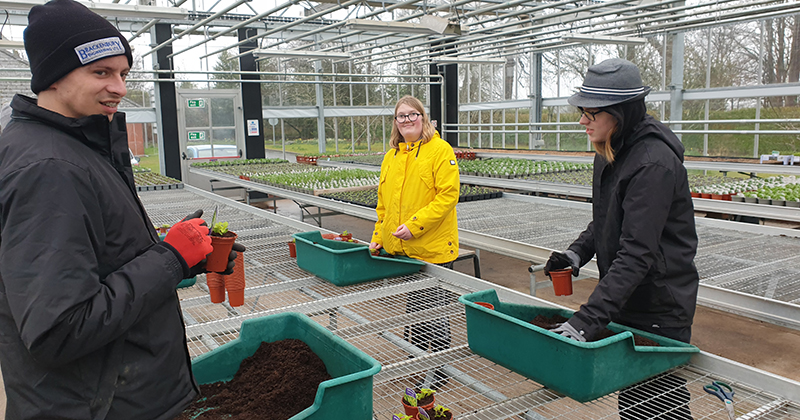
Through its huge efforts, Derwen College is helping prepare more students with additional needs for properly independent lives.
Last year 28 per cent of students went on to get jobs, both paid and voluntary, and 28 per cent went to their local college or training programme, including supported internships.
Meanwhile, 44 per cent went into other settings outside their family home, such as supported living.
They’re good outcomes, but it shows the world has a long way to go in offering these students full roles in society. Only at Derwen have I been perfectly served lunch or shown into a hotel room by someone with Down Syndrome. Why never before?
To bring that better world into being, Derwen College is modelling it here. That’s why its huge emphasis on bringing the public into its spaces matters so much.
Amy concludes for me with a grin. “Derwen has been the final and most craziest chapter of my childhood I can remember.”









Your thoughts